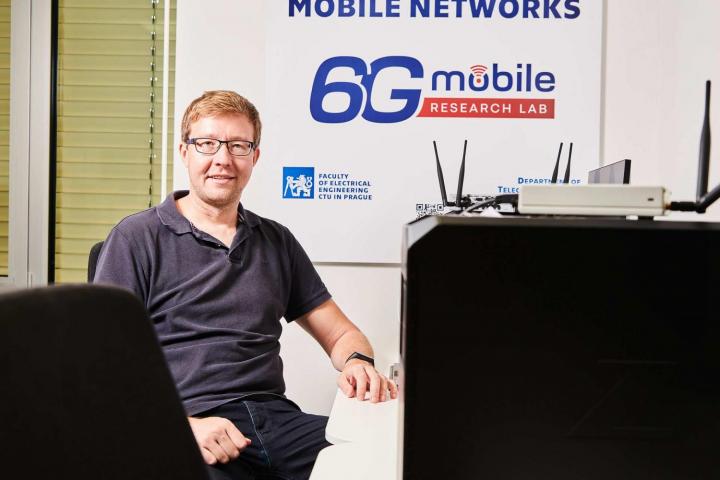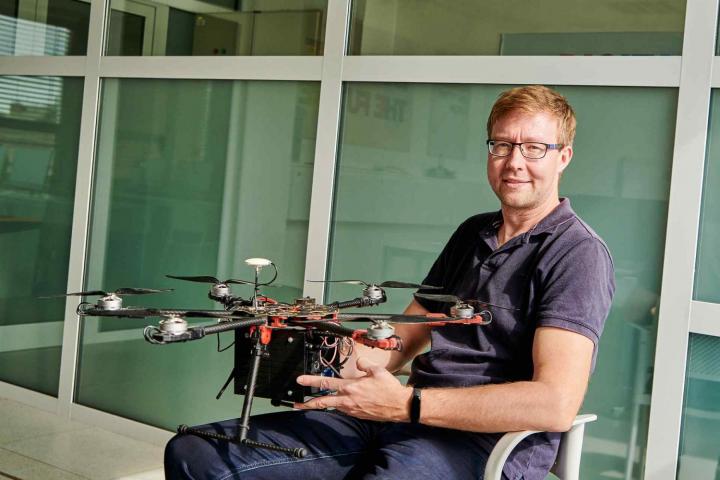
Today, the Faculty of Electrical Engineering (FEL) inaugurated a new 6Gmobile research lab, where scientists from the Department of Telecommunication Engineering will solve a number of current problems, such as the use of machine learning for advanced communication directly between terminals (D2D) or the use of drones as flying base stations. In addition to 5G communications, the newly equipped independent experimental laboratory will also enable research and development of the next generation of 6G mobile networks, which are expected to be launched in the late 2020s and early 2030s.
A team of about fifteen scientists and students from FEL has already successfully verified the results of the research on potential new functionalities of 6G networks in the newly built laboratory. "The first experiments confirm that communication control based on deep neural networks will be suitable for deployment in networks with a very high number of communicating devices, where traditional solutions used for example in 4G or 5G networks are already facing their limits. Our proposed solution using deep neural networks is patent protected," explains Doc. Zdeněk Bečvář from the Department of Telecommunication Technology, who heads the new research laboratory.
As far as the use of 6G networks is concerned, the possibilities are open, but already today, according to Doc. Bečvář, it can be assumed that mobile networks in the near future will significantly increase transmission speeds and enable new applications such as real-time hologram transmission and at the same time increase the reliability of communication, for example, between cars in traffic and thus their safety.
Thanks to 6G networks, it will also be possible to increase data traffic at concerts or sports matches, wherever there is temporary network congestion. For these purposes, researchers from the FEL CTU have developed a prototype drone that serves as a base flying station providing temporary services to the mobile network also during short-term outages, for example during emergencies.
6G mobile research lab will collaborate with top labs from around the world
The lab is based on software-defined networking, where specific mobile network hardware is replaced by powerful computers and individual mobile network functions are implemented in software. The lab uses the open software OpenAirInterface, whose development was initiated by the French university EURECOM and which is now being developed by leading mobile communication companies such as Nokia Bell labs, Qualcomm, as well as Facebook.
"University mobile networks based on a software-defined solution using, for example, OpenAirInterface are a global trend, as the developer has detailed control over the entire technology and can also configure and modify any detail of the network, which specialized commercial solutions do not allow. The cost of building such a network is lower than for a network based on conventional specialized products, and the network has a longer lifetime, because extending it with new functionalities consists in modifying open source code," says Doc. Zdeněk Bečvář. Thanks to this, the new laboratory will be able to collaborate on research and development of mobile networks with top institutes around the world, including TU Munich and EURECOM.
The laboratory is equipped with a total of eighteen devices that can be configured either as a base station or mobile devices for research purposes. However, it is also possible to communicate with conventional phones and modems to verify the functionalities of 5G mobile networks and test new applications. Furthermore, the lab is equipped with two powerful servers for edge computing.
"We are pleased to have successfully validated our theoretical solution and results published in the prestigious IEEE Transactions on Wireless Communications, where we proposed a method for predicting the quality of a communication channel between two devices using machine learning. In the laboratory, we have verified that our new algorithm works on a live network similarly to simulations and we are fine-tuning the solution for use in practice," says Dr. Jan Plachý from the Department of Telecommunication Engineering, FEL CTU in Prague.
About 6G mobile research lab
The newly opened independent laboratory is equipped with equipment that enables the emulation of 5G mobile networks in full compliance with current standards. However, unlike similar networks equipped with commercial specialized products, it not only enables testing of common 5G network services, but also serves to verify new solutions, optimization and parameter tuning, including for future 6G networks.
You can more information here.
Photography, courtesy of: Petr Neugebauer, FEL CTU
